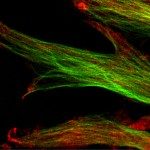Lien vers Pubmed [PMID] – 14660585
J. Biol. Chem. 2004 Feb;279(9):7495-504
All living cells possess adaptive responses to environmental stress that are essential to ensuring cell survival. For motile organisms, this can culminate in avoidance or attractile behavior, but for sessile organisms such as plants, stress adaptation is a process of success or failure within the confines of a given environment. Nearly all bacterial species possess a highly evolved system for stress adaptation, known as the “stringent response.” This ancient and ubiquitous regulatory response is mediated by production of a second messenger of general stress, the nucleotide guanosine-3′,5′-(bis)pyrophosphate (ppGpp), which mediates reprogramming of the global transcriptional output of the cell. Accumulation of ppGpp is stress-induced through the enzymatic activation of the well known bacterial ppGpp synthetases, RelA and SpoT. We have recently discovered homologues of bacterial relA/spoT genes in the model plant Nicotiana tabacum. We hypothesize that these homologues (designated RSH genes for RelA/SpoT homologues) serve a stress-adaptive function in plants analogous with their function in bacteria. In support of this hypothesis, we find 1) inducibility of tobacco RSH gene expression following treatment with jasmonic acid; 2) bona fide ppGpp synthesis activity of purified recombinant Nt-RSH2 protein, and 3) a wide spread distribution of RSH gene expression in the plant kingdom. Phylogenetic analyses identifies a distinct phylogenetic branch for the plant RSH proteins with two subgroups and supports ancient symbiosis and nuclear gene transfer as a possible origin for these stress response genes in plants. In addition, we find that Nt-RSH2 protein co-purifies with chloroplasts in subcellular fractionation experiments. Taken together, our findings implicate a direct mode of action of these ppGpp synthetases with regard to plant physiology, namely regulation of chloroplast gene expression in response to plant defense signals.

